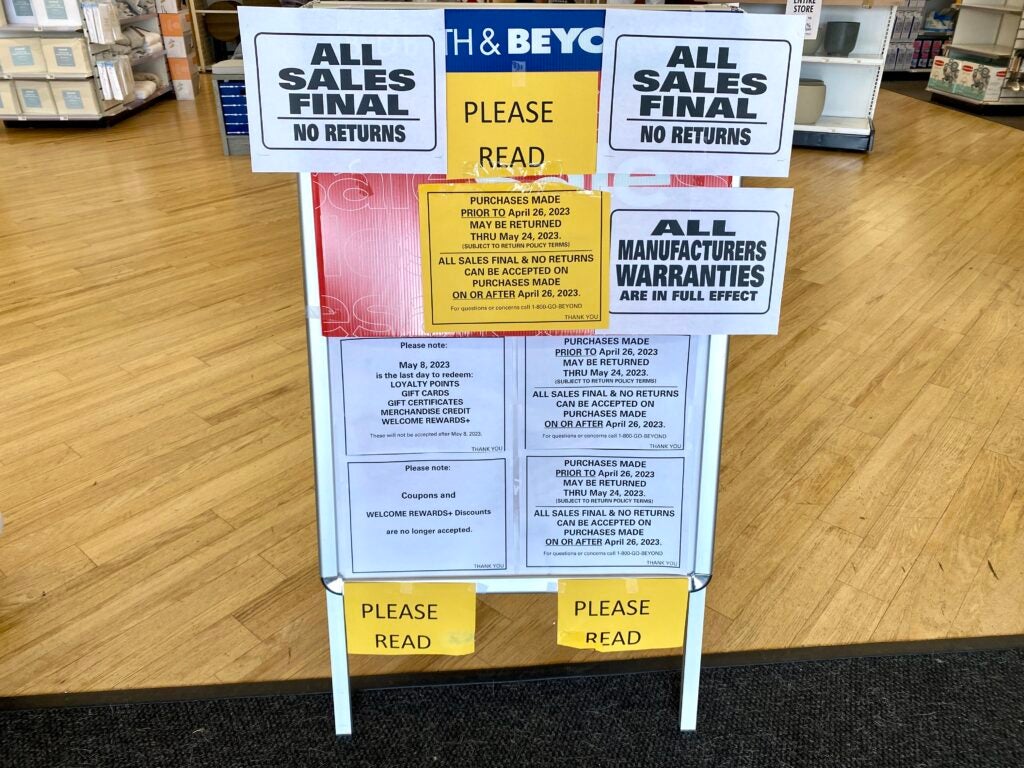In some sad news for college students and new parents, 52-year-old retailer Bed, Bath & Beyond is expected to close all its stores this summer, including those of its subsidiary buybuy Baby, after filing for bankruptcy.
The specialty home retailer has 360 locations, down from a peak of 970 stores, while buybuy Baby, which was acquired by the retailer in 2007, has 120 locations. All are expected to close by June 30.
Augusta has a Bed, Bath & Beyond and a buybuy Baby on Robert C. Daniel Jr. Parkway.
Liquidation sales have begun at the stores, which will stop accepting gift cards after May 8 and already stopped accepting coupons after April 26.

The company said it’s looking for a buyer for some or all of its assets to maximize value for stakeholders, according to bankruptcy filings with the Bankruptcy Court for the District of New Jersey.
“Bed Bath & Beyond has pulled off long shot transactions several times in the last six months, so nobody should think Bed Bath & Beyond will not be able to do so again,” wrote chief financial officer Holly Etlin in a court filing.
Bed Bath & Beyond, which has approximately 14,000 employees, said it closed over 430 unprofitable and marginally profitable stores before filing for bankruptcy.
The company has suffered from credit agreement defaults, the “retail apocalypse” and the COVID-19 pandemic’s impact on consumer behavior, Etlin said.
In-store sales for the last three months of 2022 fell by nearly $1 billion compared to the same period of 2021, according to Etlin. This put a strain on vendor credit relationships, which led to a drop in inventory.
“Bed Bath & Beyond is simply unable to service its funded debt obligations while simultaneously supplying sufficient inventory to its store locations,” Etlin wrote.
The company said that $240 million in funding from Sixth Street Specialty Lending will sustain it through the liquidation process.

While Bed, Bath & Beyond was able to survive the 2008 Great Recession, its reluctance to invest in its online business was “one of the consequential, early decisions that ultimately led to this day,” Etlin said. The supply chain constraints and inflationary prices resulting from the pandemic crushed any turnaround efforts, she said.
The company’s stock hit an all-time high of $80 per share in 2014 but by 2018 had fallen to $14 per share, erasing $15 billion in value. Shares are now trading at 11 cents.
The bankruptcy announcement comes just weeks after David’s Bridal filed for bankruptcy protection due to similar issues, including significant operating expenses, challenges from the COVID-19 pandemic and increased competition from online retailers.
Discount retailer Tuesday Morning Corp., which has a location on Washington Road, also filed for bankruptcy back in February, citing inflationary pressures, supply chain issues and changing consumer behavior.
The domino of retail bankruptcies will leave some prime real estate locations open for new tenants in Augusta’s most popular shopping centers.










